Re/Marks on Sharing Stories
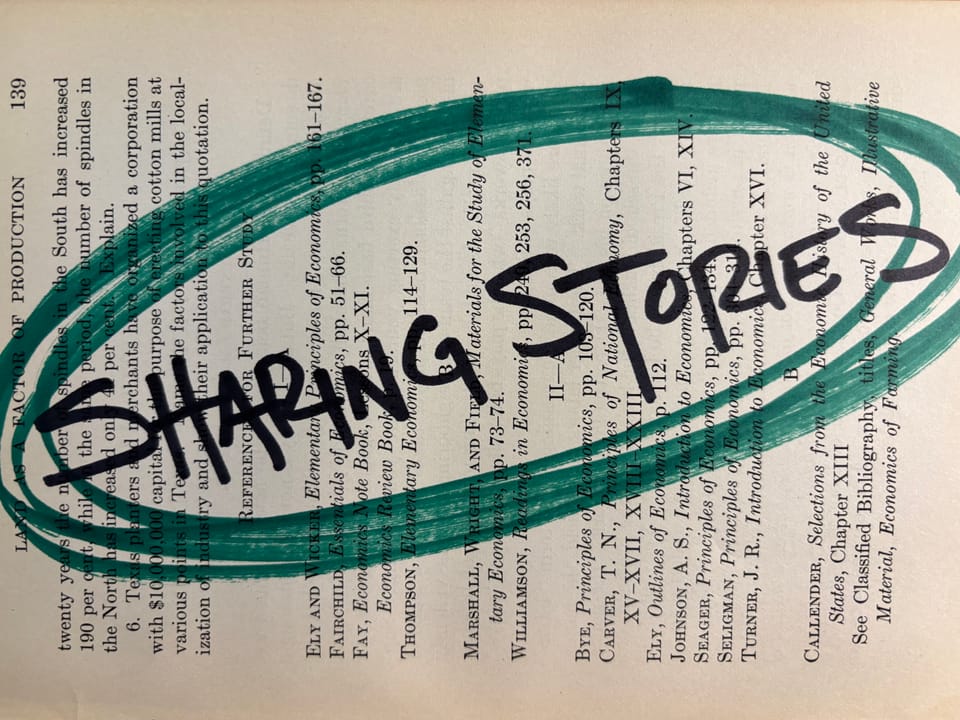
A few weeks ago, on a Saturday afternoon, our family sat in a backyard with about forty other people celebrating community, remembrance, and stories. Part pop-up documentary and part block party, both organized to honor the legacy of Winston-Salem's Black Panther Party, the gathering featured an intimate conversation between Martha S. Jones and Tressie McMillan Cottom.
At one point during the conversation, Dr. Tressie shared: “The only thing that’s changed the world is a story.”
Dr. Tressie's observation—this truth—has been close to my mind and heart as, over the past week, I've watched folks respond to the release of my book Re/Marks on Power: How Annotation Inscribes History, Literacy, and Justice.
Now, I'm not suggesting that my book has sparked any worldly change. Rather, I do know that Re/Marks on Power is my attempt to share a series of stories about how annotators have made use of their everyday literacies, have made visible their re/marks, so as to contest dominant narratives, oppose hateful ideology, and broadcast solidarity and activism. In other words, annotation can enable social, material, and even political change in our world.
I hope my book usefully documents a few stories about annotators whose re/marks have changed the world.
And, should my stories of annotators and their marks resonate with readers, it is only because others encouraged and entrusted me to share a story, or share their story, and to do so with veracity and respect.
For instance, the second chapter of Re/Marks on Power concerns public recognition and remembrance of Harriet Tubman. The story I share about Tubman features both my analysis of annotations that have publicly narrated her legacy for 150 years, as well as my presentation of her own handwritten marks. Yes, Tubman was an annotator. My decision to share her story in this way, to highlight her marks, may seem like an odd—perhaps even a daring or inappropriate—endeavor on my part as a scholar. After all, I am not a historian.
How fortunate, then, that I received support from none other than Kate Clifford Larson, historian and bestselling author of the acclaimed biography Bound for the Promised Land: Harriet Tubman, Portrait of an American Hero. In early 2023, I reached out to Kate via email, mentioned a project I was working on, and invited her feedback and critique. I was unsure about whether or not I'd ever receive a response; I certainly wasn't expecting one the very same day. And Kate not only replied. Ultimately, she fact-checked my work and also shared a few of her own stories and reflections with me. I have since read that Kate has similarly supported other authors celebrating Tubman's life and legacy, as with Tiya Miles who writes in her notes about Night Flyer: Harriet Tubman and the Faith Dreams of a Free People that Kate was "stunningly generous with her behind-the-scenes and off-the-page knowledge and resources... as a quiet check and guide."
Kate provided me, a stranger, a scholar and writer of quotidian notes, with the confidence that I could accurately read the archive, identify something useful previously overlooked, and provide an original interpretation of Tubman's own marks. Thank you, Kate, for helping me to share this story.
And many other generous scholars, artists, educators, authors, and librarians also helped me to comprehend and carefully share the other stories that appear throughout Re/Marks on Power.
As another notable example, and so as to support my writing about the US-Mexico border and the murals that mark this annotated boundary, how fortunate that I interviewed and was encouraged by Lizbeth De La Cruz Santana. Thank you, Lizbeth, for helping me to share stories that transcend boundaries:
The Playas de Tijuana Mural Project is a critical marker opposing what Rael calls a “wall of death” by annotating the barrier with stories of hope and home.
And in writing about marked monuments and the literacies of young learners in New Orleans who reimagined their city's memorials, how fortunate that I interviewed and was encouraged by Amy Dickerson. Thank you, Amy, for helping me to share stories of critique and creativity:
We will meet a class of third-grade students in New Orleans, and their teacher, who creatively reimagined their city’s memorial landscape after four Confederate monuments were removed in 2017. The students’ self-published book is anything but a simple class project; rather, it’s a guide celebrating how children’s re/marks enable critical, creative, and civic visions.
And in writing about how public and school librarians supported trans youth and LGBTQIA+ representation in literature, how fortunate that I interviewed and was encouraged by Alex Gino, author of Melissa. Thank you, Alex, for helping me to share stories of activism and affirmation:
We should commend public libraries that not only marked Melissa but then chose to broadcast re/marks about who is welcome in the library and whose stories should be celebrated.
Stories do change the world.
I'm grateful to those folks who've helped me share stories of how annotation has done just that.
Book Talk and Annotation Jam
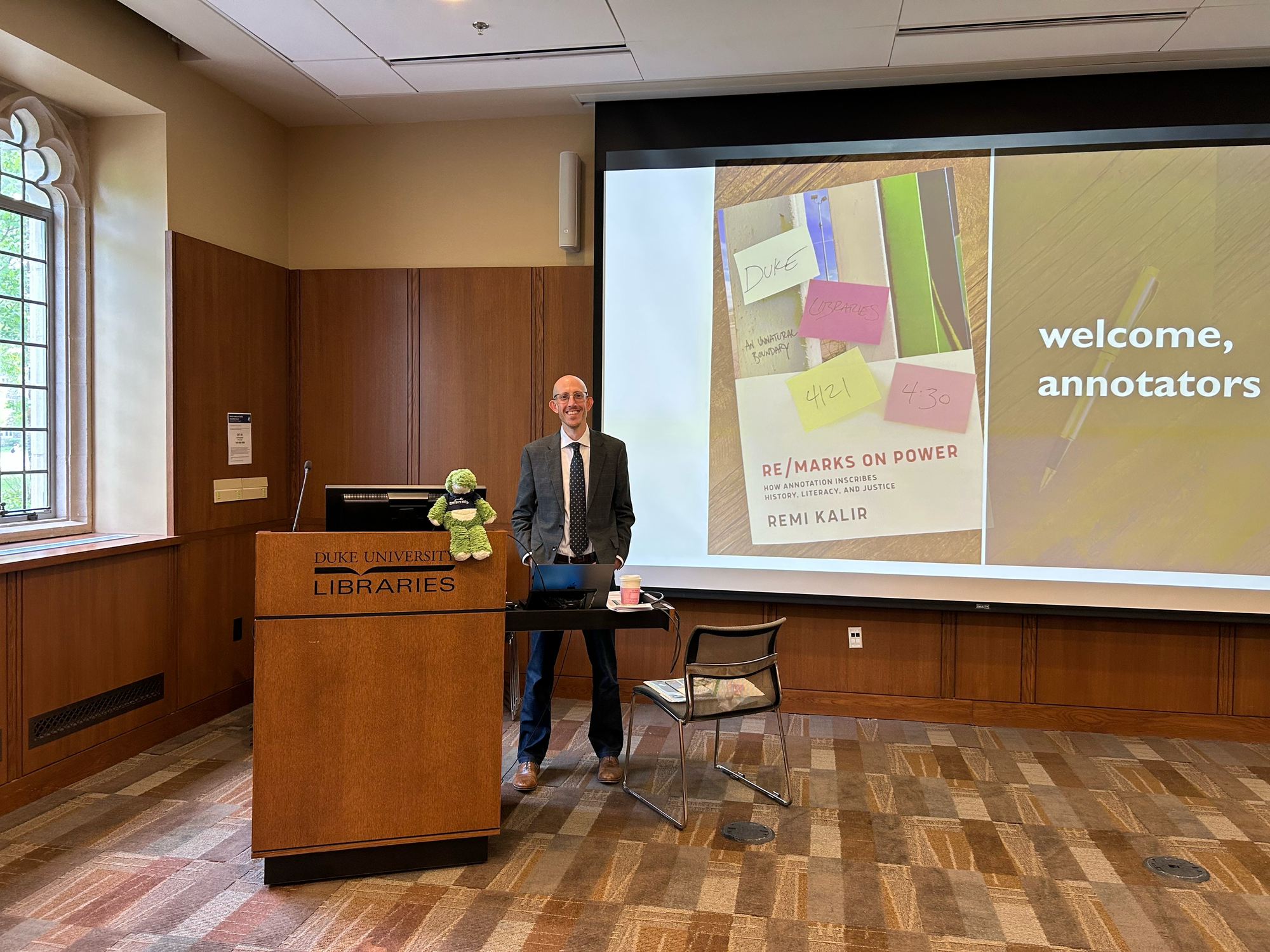
Two days ago, I had the honor of speaking at an event hosted by Duke Libraries and Duke Learning Innovation and Lifetime Education (and that's my amazing organization's crocodile mascot in the picture). The event was both a book talk and "annotation jam." And yes, we made some wonderful marks together.
I created small notebooks, similar to a zine, featuring quotes and images from Re/Marks on Power, as well as ample margins for annotator commentary. As I mentioned on social media prior to the event, if you invite me to your campus to speak about my book, I'll create and bring custom notebooks—each individually numbered and inscribed—for our annotation jam.
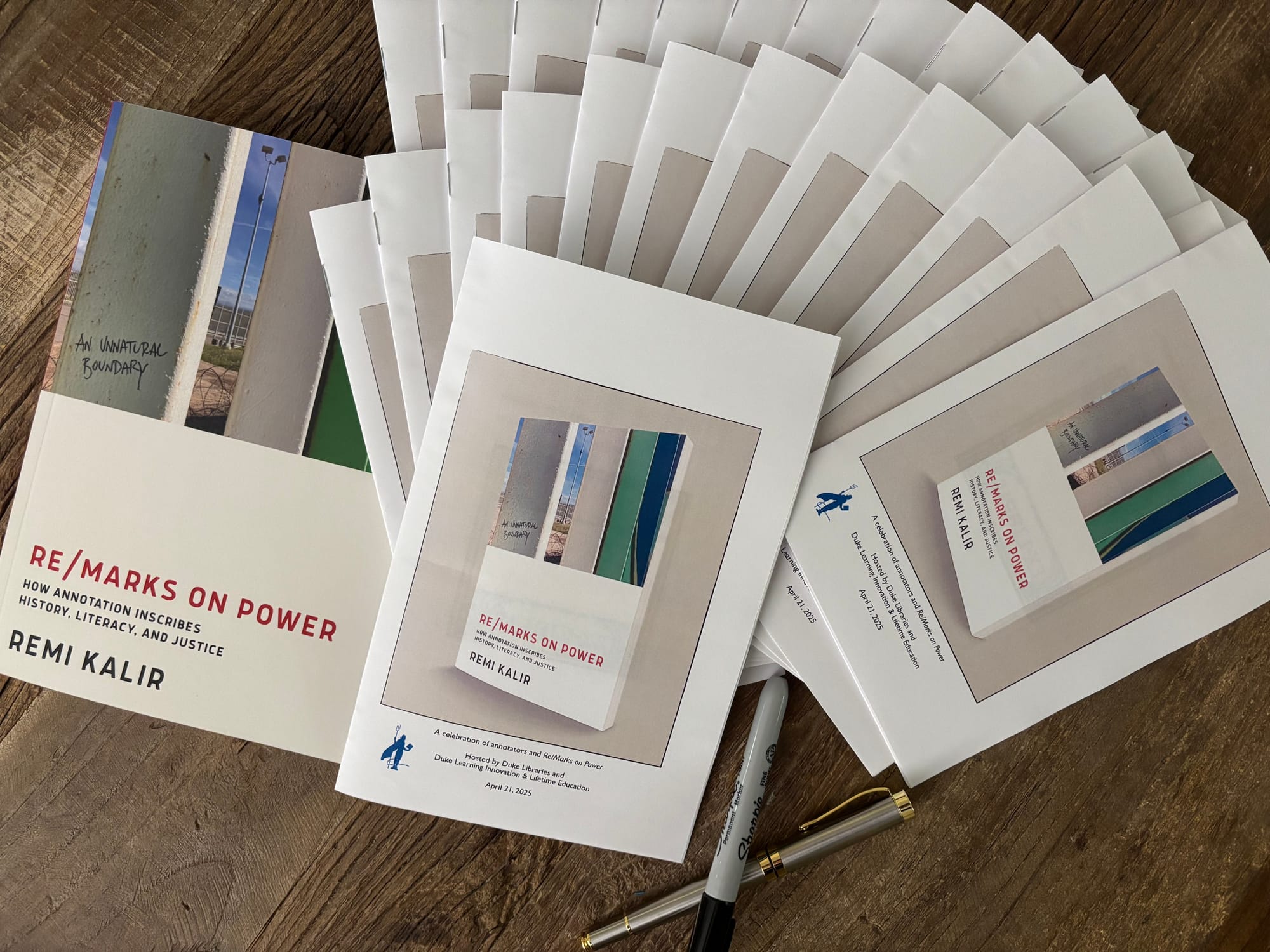
Following my short talk about Re/Marks on Power, I invited everyone to gather together around large tables with their notebooks, and then to add their original annotations, exchange their notebooks with neighbors, respond to one another's commentary, doodle and draw, and circulate curiosity and collective mark-making. The annotation jam was an enjoyable, participatory way to make sense of my work and our time together (and thanks for sharing this picture of your annotated notebook, Sandra!).
Please contact me if you'd like to organize a visit to your campus so I can share Re/Marks on Power and facilitate a similar annotation jam.
Requesting Re/Marks #1
With the release of Re/Marks on Power, our subscriber community here at Reading Re/Marks is growing–thanks everyone!
As a reminder, you're invited to share a re/mark documenting our annotated words and world, and we're starting with STOP.
I've already received a few submissions, and I plan to publish subscriber-submitted examples of annotated STOP signs later this spring. Thanks for sharing your photos with the Reading Re/Marks community.

Purchase: Order Re/Marks on Power via PRH and use code READMIT20 to receive 20% off your purchase of the book.
Share: Please share your photos of the book on social media, like Charles on BlueSky and Susan on LinkedIn, thank you!
Review: Your reviews on sites like Amazon and Goodreads are quite valuable and help introduce new readers to the book, so please add your thoughts.
Know an annotator who should be featured in Reading Re/Marks? Send me a note!
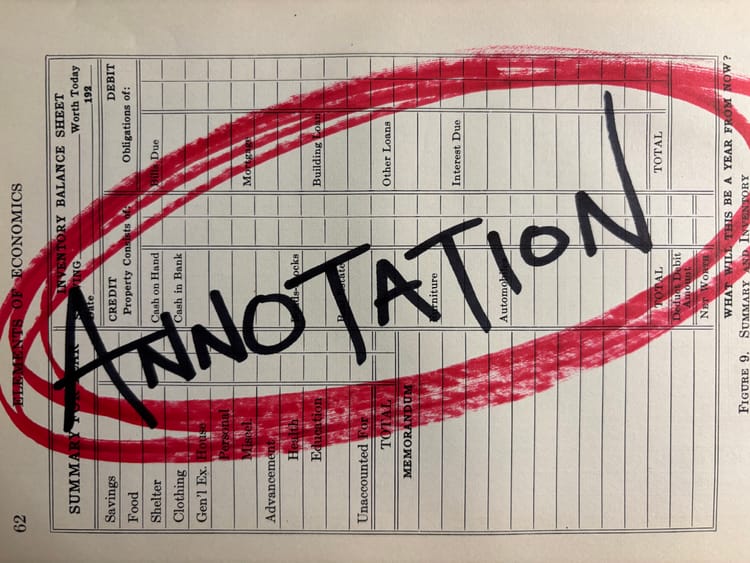
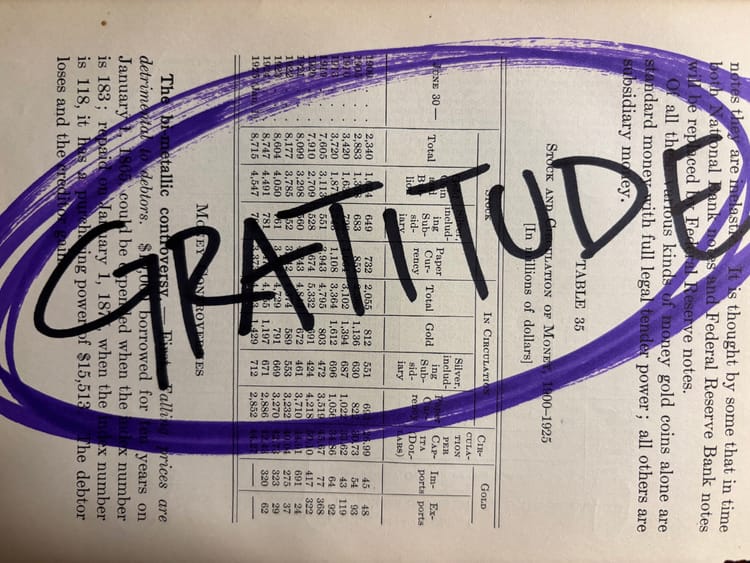
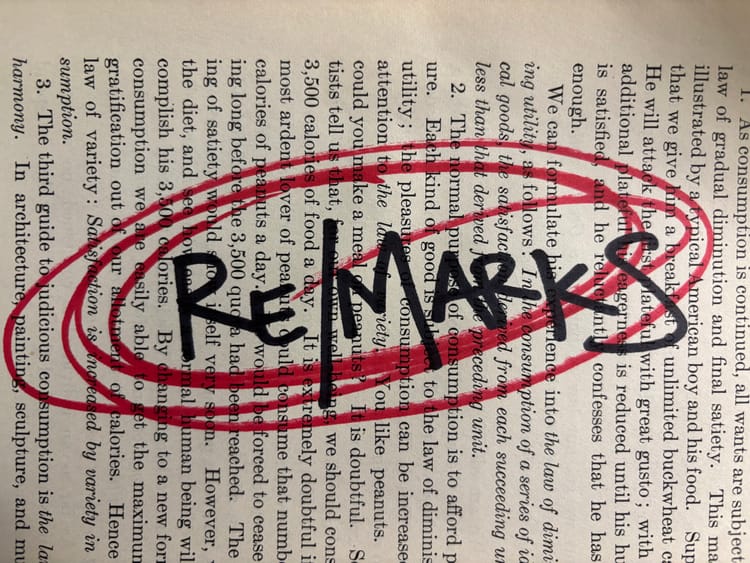
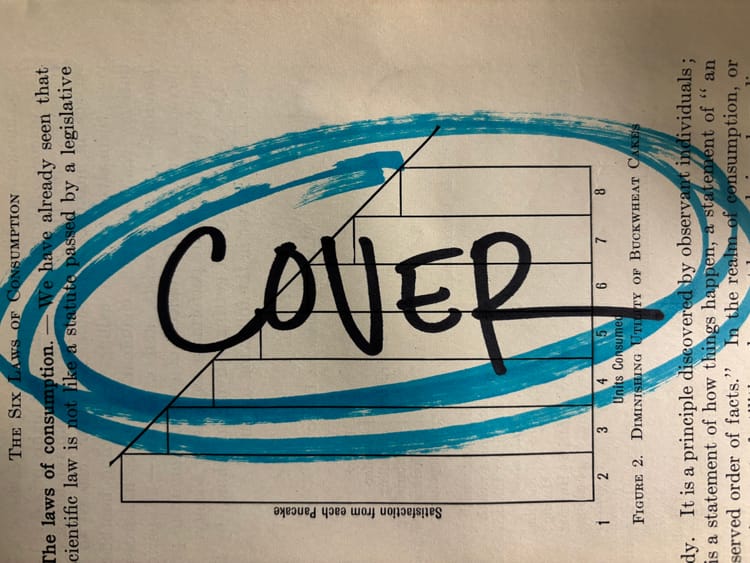
Member discussion